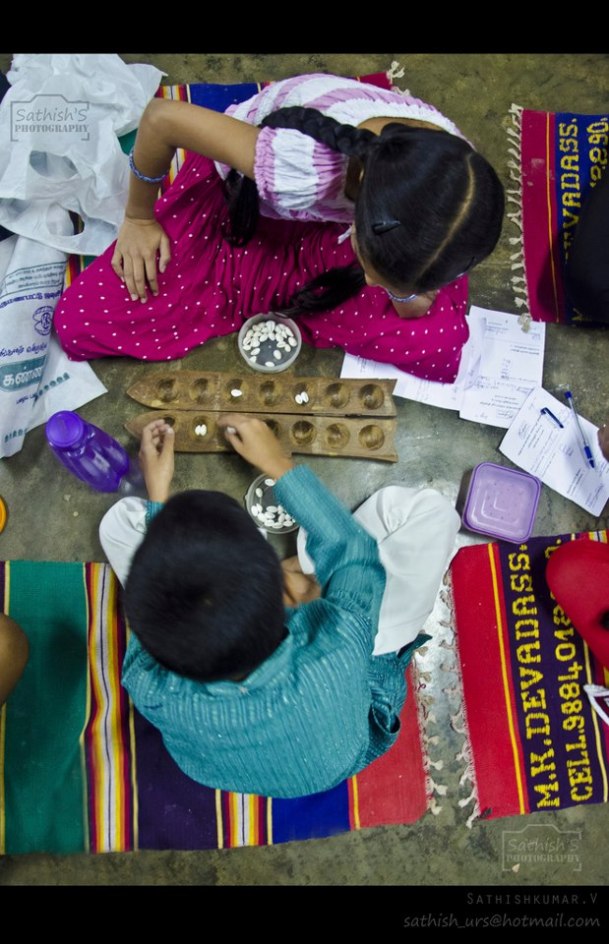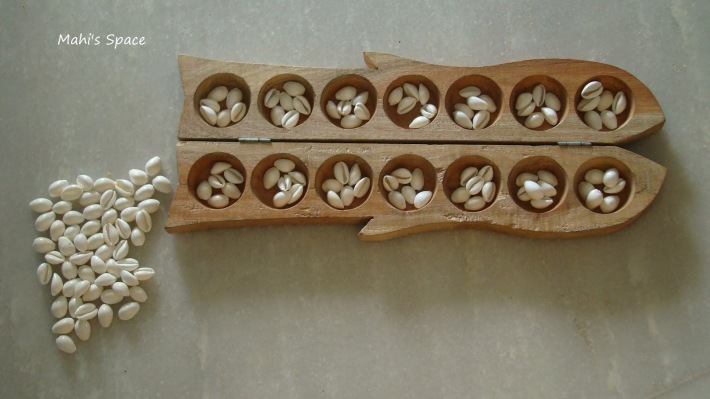
Pallanghuzi is a traditional mancala game played in South India (especially Tamil Nadu, Andhra Pradesh and Kerala), Sri Lanka and Malaysia. The game is played by two players, with a wooden board that has fourteen pits in all (hence the name from the words fourteen pits (pathinaalam kuzhi). There have been several variations in the layout of the pits, one among them being seven pits on each player's side. The pits contain Cowry shells, seeds or small pebbles used as counters. There are several variations of the game depending on the number of shells each player starts with.

Pallanguzhi is played on a rectangular board with 2 rows and 7 columns. There are a total of 14 cups (kuzhi in Tamil language) and 146 counters. For the counters in the game, seeds, shells, small stones are all common for use. As the game proceeds, each player distributes the shells over all the pits. The players may capture the shells, as permitted by the rules of the game. The rules of capture depend on the variant of the game played. The game ends when one of the players captures all the shells, and is declared as a winner.
12 counters are placed in each cup except the middle of each row into which only 2 counters are placed. The starting player lifts the counters from any of his holes and, going counter-clockwise, distributes one counter in each hole. If he reaches the end of his cups he goes on the his opponent's side of the board. When the player drops his last counter, he takes the counter from the next cup and continues placing them in this way. If the last counter falls into a cup with an empty cup beyond, the counter in the cup beyond the empty hole are captured by the player and put into his store. That player then continues play from the next cup containing counters. If the last counter falls into a cup with two empty holes beyond, he captures no counters and his turn is over. The next player continues play in the same way, taking counters from any of his cups and going around placing counters in a counter-clockwise direction.
If, after having a counter dropped into it, a cup contains 6 counters, those become the property of the player who dropped the counter (called Pasu in Tamil language) . The round is over when no counters remain.
Once the first round is over players take the counters from their stores and fill as many of their holes as possible with counters. The winner will have a surplus of counters which are kept in his store. The loser of the first round will be unable to fill all of his holes. These unfilled holes are marked as "rubbish holes." In the next round play continues as before, but without the rubbish holes being included and the player who went first in the previous round going second.
During the game if a player has enough counters to fill any of his rubbish holes back up their status is removed and they are again used during play. The game is over when a player is unable to fill any cups with six counters at the end of a round.
Objects
Tamarind seeds and chozhis (cowry shells) are used in this game, to fill the holes of the Pallanguzhi board.
No comments:
Post a Comment